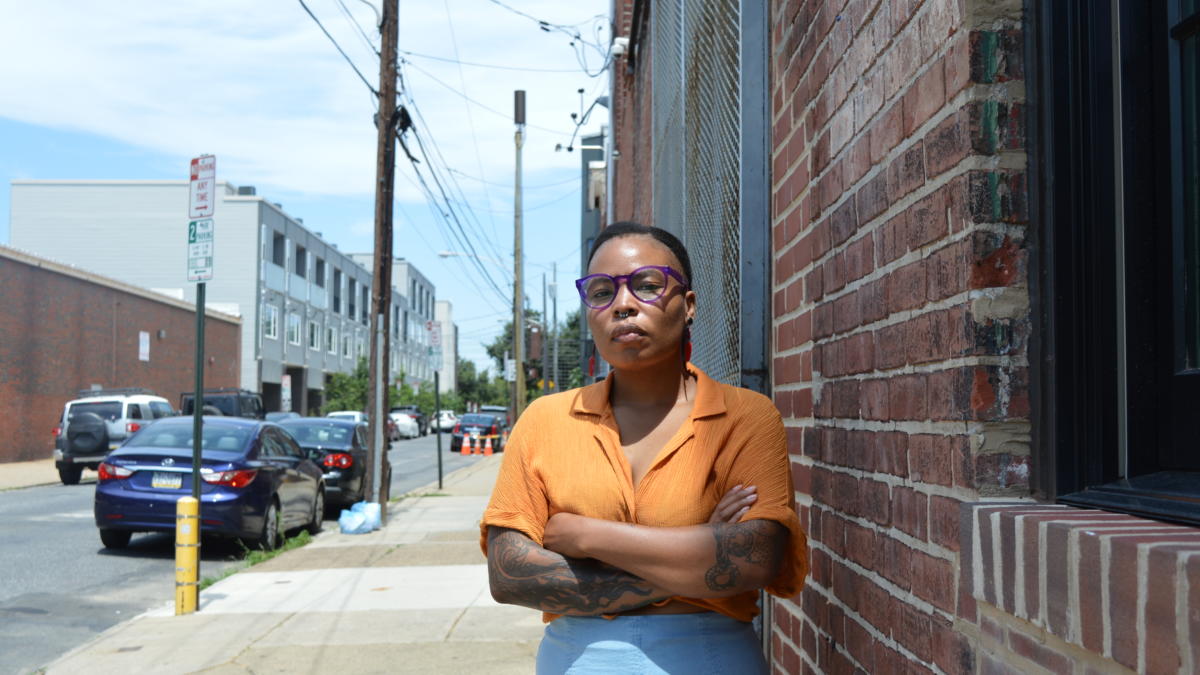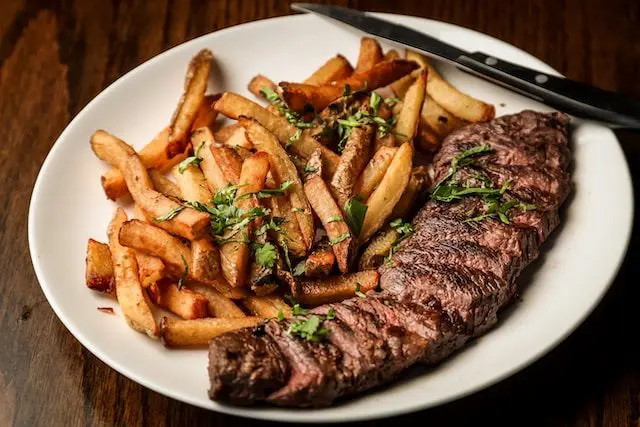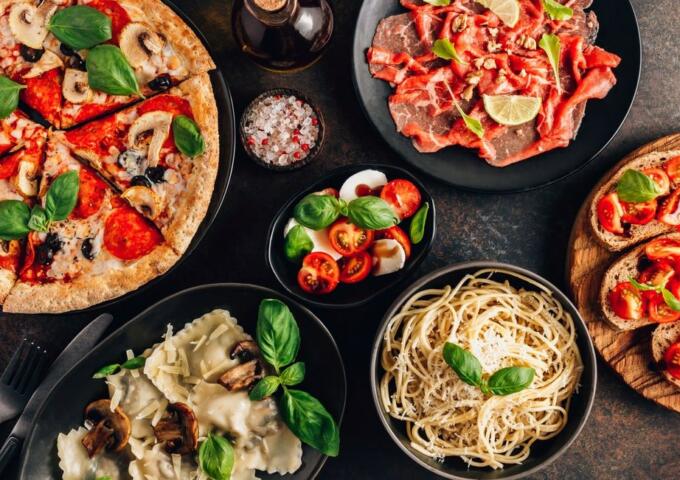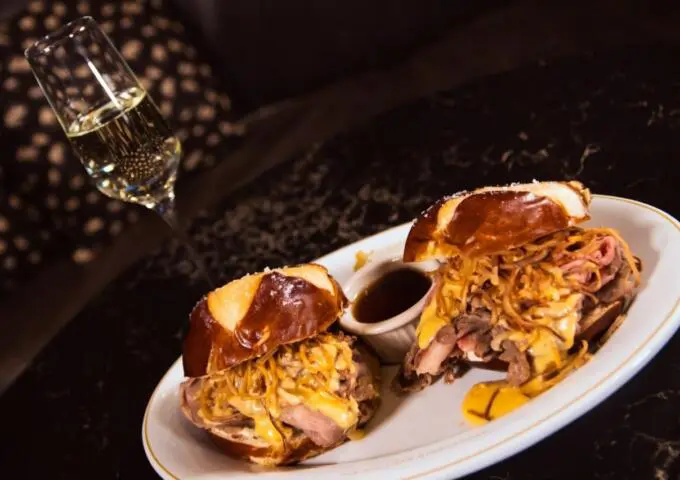Adesola Ogunleye will be the first to tell you that after working in the foodservice industry for over 15 years, there’s not much that comes as a surprise anymore.
Whether it’s been dealing with multifaceted personalities of the patrons at the front of the house, while dealing with management styles in the back, being immersed in the brotherhood that is Philadelphia’s industry scene has been something Ogunleye has held a passion about.
So when she accepted a job at Laser Wolf in Fishtown, she thought she struck gold. Good dining, close to home, a new establishment with a solid menu and fresh ideas. Not long after it opened its doors, Laser Wolf was forced to close them due to mandatory closures of businesses determined as non-essential. For three months, Ogunleye, who is a DACA recipient, didn’t even know if she qualified for unemployment compensation benefits and was forced to rely on the good graces of others to get by.
So when Laser Wolf announced its reopening earlier this summer and Ogunleye was called back to work, despite not knowing what to expect, the call felt like a welcomed return to some semblance of normalcy.
Her return would last the weekend before she made the decision to call it quits.
“People were out here behaving like COVID-19 [doesn’t exist],” Ogunleye said. “You have to remind people to wear a mask when you got to the table and people were staying like two hours past closing, I’m sorry this is just not the time to be doing that.”

To exacerbate matters for Ogunleye, her Type 2 Diabetes status meant she was in an immunocompromised state and catching COVID-19 from one mistake could be disastrous for her – perhaps even fatal.
“I’m Type 2 diabetic, which really weakens your immune system very, very, very badly,” she said. “It’s harder to heal from just about everything. If you got a cold, you might be over it in let’s say three or four days. I have had simple colds for two weeks, three weeks sometimes. My managers at Laser Wolf were great and understanding, I just couldn’t risk my health, even though, yeah, I could really use the money, right now.”
The decision Ogunleye was forced to make is one facing thousands of tipped workers, specifically those in the food industry. As it stands today, the federal sub-minimum wage for restaurant workers is $2.13 an hour, with Pennsylvania being one of 43 states that adhere to that wage and Philadelphia coming in as one of the cities in which hardly any of its dining establishments – including those in fine dining – barely go beyond $5 an hour in base pay.
“People were out here behaving like COVID-19 [doesn’t exist]. You have to remind people to wear a mask when you got to the table and people were staying like two hours past closing, I’m sorry this is just not the time to be doing that.”
– Adesola Ogunleye, former server and creator of the Be Wary Philadelphia forum for food industry workers
Additionally, the fact that the base pay alone isn’t enough to afford the restaurant’s healthcare plan, a plan that many eateries don’t offer until months into the job – even during the pandemic.
Also, since the restrictions have eased and people have slowly started to hit establishments again, tips for servers have actually decreased, making a need for either a higher base hourly rate or even hazard pay a standard. One Fair Wage, an organization advocating for the rights of tipped workers, estimated that gratuities are down 75-90 percent nationwide, and workers on low base salaries don’t even make enough to qualify for unemployment.
“It’s been worked out so that [servers] are getting the same amount of covers per person, but as far as tips, yeah they’ve definitely gone down,” a Bud & Marilyn’s server told PW under the condition of anonymity. “Before the shutdown, I was pulling like 20-22 percent on tips and now it’s more like 15-16 percent with the same base pay. I mean everyone I’ve talked to who works there is unhappy with it, but the management there historically hasn’t been too kind to people who speak out, so everyone’s just kind of dealing with it. It’s almost like the bad outweighs the good of actually having gainful employment – if you can call it that.”
The struggle isn’t unique to Philadelphia, in fact in New Jersey, New York and in other states nationwide, people in the industry have been speaking out about the unrealistic pay and the lack of a solution from restaurateurs who need these staff members to stay afloat. Just last month, One Fair Wage held a nationwide rally for tipped workers not only looking at the paltry numbers when it comes to base pay but the disproportionate amount of people of color who struggle to make ends meet in the profession.
People like Ogunleye, who recently created a Philadelphia forum of the Be Wary list for industry workers to vent about the current state of the restaurant scene. In it are multiple accounts of unfair treatment at the hands of both restaurant management, staff and patrons who frequent some of the top restaurants in the city.
A recurring theme is low and sometimes even missed wages along with the improper wearing of personal protective equipment.
“What I’ve noticed from this and other industry subgroups on Facebook is that a lot of people are just afraid to speak up,” said Ogunleye. “Not only could it mean their job, but a lot of these managers know each other from other restaurants. It’s a small city and an even tighter industry, and being blackballed is a real thing.”

Perhaps this is why many people are afraid to speak out and are hoping that their plight gets noticed by officials, who can actually spark change. One official, in City Councilmember Helen Gym, has made the plight of low-wage workers a mission of hers to correct. Earlier this year, Gym helped introduce the Fair Workweek law, which is supposed to force Philadelphia’s establishments to provide better pay and more stability in work schedules.
“This pandemic has shone a clear light on how unacceptable the poverty wages in the food industry have been,” Gym noted via email to PW. “Look, $2.13 is a poverty wage, not a living wage. It wasn’t an acceptable wage when it was established as a means to undercut tipped workers, and it is not today. Clearly, when 80 percent of food service workers don’t have or cannot afford health insurance, things need to change – and fast. Our restaurants and food industry is a core part of Philadelphia’s character, our economy, and our cultural fabric, but it has to do a lot better by its workers.”
There are a handful of establishments recognizing that a happy employee leads to a better establishment and, despite feeling the effects of a dwindling clientele and subsequent loss of profits, are doing right by their staff.
“This pandemic has shown a clear light on how unacceptable the poverty wages in the food industry have been. Clearly, when 80% of food service workers don’t have or cannot afford health insurance, things need to change – and fast. Our restaurants and food industry is a core part of Philadelphia’s character, our economy, and our cultural fabric, but it has to do a lot better by its workers.”
Philadelphia City Councilmember Helen Gym
“We truly understand the difficult position that not only operators face with asking staff to return to work and providing a safe work environment, but also staff members deciding if they are even comfortable returning to work,” said Qamara Edwards, director of business and events for the Sojourn Philly group, which oversees management for South Street’s Jet Wine Bar, Rex 1516 and Café Ynez on Washington Avenue. “Because of this extraordinary predicament, we have offered our staff hazard pay rates above minimum wage – not tipped minimum wage – in addition to collecting gratuity. All hourly positions have shifts under eight hours per day, and we have reinforced our sick pay policy so that staff can feel comfortable knowing that they will still receive their wages if they are unable to return to work due to feeling any symptoms or illness.
In making this move Edwards tells PW that feedback from staff “has been positive,” and that they’ve been able to retain close to 90 percent of their original workforce across all of their holdings.
It’s tough to ask struggling restaurant ownership groups to adopt the same policies unless it was largely enforced, and right now many groups are trying to figure out how to survive amid the pandemic. Seasonable temperatures have allowed for outside seating and subsequently a way for many establishments to turn a profit, but at the time of this report, there is no solution for what restaurants will do once fall months turn into colder temperatures and restrictions on indoor dining are enforced.

So could things get worse before they get better for tipped workers, especially black and brown workers already feeling the effects of racial inequities in the restaurant industry? It’s possible.
According to One Fair Wage, customer and employer racism and sexism all play a significant role in what tipped workers take home. The organization estimates that both women, specifically women of color, make $5 an hour less than white men tipped workers nationally. On a level in Pennsylvania, the state profits regardless of color considering every dollar spent in the table-service segment contributes $1.91 to the state economy, according to data from the National Restaurant Association.
Essentially, it benefits public officials to create change since that change benefits state coffers and funding for a host of initiatives. So is that change coming?
“I support [any] campaign to bring all food industry workers up to $15 an hour, especially those in the back of the house who are often at the $7.25 minimum,” reiterated Gym.
As for Ogunleye, her solution to the problem is multifaceted, but an approach that seems logical. A job in the industry right now is at the risk of one’s health. She wonders why that is not apparent to patrons and owners alike.
“If you’re bringing back a limited staff, they should be paying them a living wage,” she said. “Most of these places are crying poor, but they’re bringing back such a limited staff, you can afford to pay people more than $6-7 an hour. I mean unless they are comfortable with the constant turnover, people are going to bail because it’s impossible to survive this way. You know things are not like they were before and we’re in a unique living situation now with this pandemic. People need to realize that industry workers are taking a risk every time they leave the house. Tipping them well shows them you recognize that and that you recognize that there is a struggle behind the scenes.”

Philadelphia Weekly is part of Broke in Philly, a collaborative reporting project among 24 news organizations, focused on Philadelphia’s push towards economic justice. Read more of our reporting at brokeinphilly.org.





